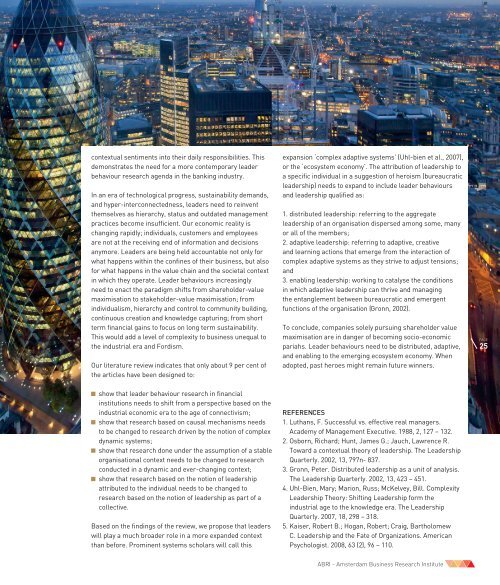Executives in Science, Business and Society 3
Create successful ePaper yourself
Turn your PDF publications into a flip-book with our unique Google optimized e-Paper software.
contextual sentiments <strong>in</strong>to their daily responsibilities. This<br />
demonstrates the need for a more contemporary leader<br />
behaviour research agenda <strong>in</strong> the bank<strong>in</strong>g <strong>in</strong>dustry.<br />
In an era of technological progress, susta<strong>in</strong>ability dem<strong>and</strong>s,<br />
<strong>and</strong> hyper-<strong>in</strong>terconnectedness, leaders need to re<strong>in</strong>vent<br />
themselves as hierarchy, status <strong>and</strong> outdated management<br />
practices become <strong>in</strong>sufficient. Our economic reality is<br />
chang<strong>in</strong>g rapidly; <strong>in</strong>dividuals, customers <strong>and</strong> employees<br />
are not at the receiv<strong>in</strong>g end of <strong>in</strong>formation <strong>and</strong> decisions<br />
anymore. Leaders are be<strong>in</strong>g held accountable not only for<br />
what happens with<strong>in</strong> the conf<strong>in</strong>es of their bus<strong>in</strong>ess, but also<br />
for what happens <strong>in</strong> the value cha<strong>in</strong> <strong>and</strong> the societal context<br />
<strong>in</strong> which they operate. Leader behaviours <strong>in</strong>creas<strong>in</strong>gly<br />
need to enact the paradigm shifts from shareholder-value<br />
maximisation to stakeholder-value maximisation; from<br />
<strong>in</strong>dividualism, hierarchy <strong>and</strong> control to community build<strong>in</strong>g,<br />
cont<strong>in</strong>uous creation <strong>and</strong> knowledge captur<strong>in</strong>g; from short<br />
term f<strong>in</strong>ancial ga<strong>in</strong>s to focus on long term susta<strong>in</strong>ability.<br />
This would add a level of complexity to bus<strong>in</strong>ess unequal to<br />
the <strong>in</strong>dustrial era <strong>and</strong> Fordism.<br />
Our literature review <strong>in</strong>dicates that only about 9 per cent of<br />
the articles have been designed to:<br />
expansion ‘complex adaptive systems’ (Uhl-bien et al., 2007),<br />
or the ‘ecosystem economy’. The attribution of leadership to<br />
a specific <strong>in</strong>dividual <strong>in</strong> a suggestion of heroism (bureaucratic<br />
leadership) needs to exp<strong>and</strong> to <strong>in</strong>clude leader behaviours<br />
<strong>and</strong> leadership qualified as:<br />
1. distributed leadership: referr<strong>in</strong>g to the aggregate<br />
leadership of an organisation dispersed among some, many<br />
or all of the members;<br />
2. adaptive leadership: referr<strong>in</strong>g to adaptive, creative<br />
<strong>and</strong> learn<strong>in</strong>g actions that emerge from the <strong>in</strong>teraction of<br />
complex adaptive systems as they strive to adjust tensions;<br />
<strong>and</strong><br />
3. enabl<strong>in</strong>g leadership: work<strong>in</strong>g to catalyse the conditions<br />
<strong>in</strong> which adaptive leadership can thrive <strong>and</strong> manag<strong>in</strong>g<br />
the entanglement between bureaucratic <strong>and</strong> emergent<br />
functions of the organisation (Gronn, 2002).<br />
To conclude, companies solely pursu<strong>in</strong>g shareholder value<br />
maximisation are <strong>in</strong> danger of becom<strong>in</strong>g socio-economic<br />
pariahs. Leader behaviours need to be distributed, adaptive,<br />
<strong>and</strong> enabl<strong>in</strong>g to the emerg<strong>in</strong>g ecosystem economy. When<br />
adopted, past heroes might rema<strong>in</strong> future w<strong>in</strong>ners.<br />
PAGE<br />
25<br />
show that leader behaviour research <strong>in</strong> f<strong>in</strong>ancial<br />
<strong>in</strong>stitutions needs to shift from a perspective based on the<br />
<strong>in</strong>dustrial economic era to the age of connectivism;<br />
show that research based on causal mechanisms needs<br />
to be changed to research driven by the notion of complex<br />
dynamic systems;<br />
show that research done under the assumption of a stable<br />
organisational context needs to be changed to research<br />
conducted <strong>in</strong> a dynamic <strong>and</strong> ever-chang<strong>in</strong>g context;<br />
show that research based on the notion of leadership<br />
attributed to the <strong>in</strong>dividual needs to be changed to<br />
research based on the notion of leadership as part of a<br />
collective.<br />
Based on the f<strong>in</strong>d<strong>in</strong>gs of the review, we propose that leaders<br />
will play a much broader role <strong>in</strong> a more exp<strong>and</strong>ed context<br />
than before. Prom<strong>in</strong>ent systems scholars will call this<br />
REFERENCES<br />
1. Luthans, F. Successful vs. effective real managers.<br />
Academy of Management Executive. 1988, 2, 127 – 132.<br />
2. Osborn, Richard; Hunt, James G.; Jauch, Lawrence R.<br />
Toward a contextual theory of leadership. The Leadership<br />
Quarterly. 2002, 13, 797n- 837.<br />
3. Gronn, Peter. Distributed leadership as a unit of analysis.<br />
The Leadership Quarterly. 2002, 13, 423 – 451.<br />
4. Uhl-Bien, Mary; Marion, Russ; McKelvey, Bill. Complexity<br />
Leadership Theory: Shift<strong>in</strong>g Leadership form the<br />
<strong>in</strong>dustrial age to the knowledge era. The Leadership<br />
Quarterly. 2007, 18, 298 – 318.<br />
5. Kaiser, Robert B.; Hogan, Robert; Craig, Bartholomew<br />
C. Leadership <strong>and</strong> the Fate of Organizations. American<br />
Psychologist. 2008, 63 (2), 96 – 110.<br />
ABRI - Amsterdam Bus<strong>in</strong>ess Research Institute

















